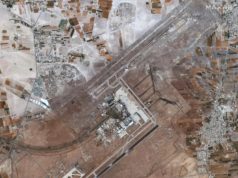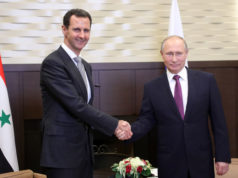Former National Security Advisor Zbigniew Brzezinski took a hard line on Russia’s recent military incursion into Georgia, advising: “Not only the West, but the rest of the international community, must make it clear that this kind of behavior will result in ostracism and economic and financial penalties. Ultimately, if Russia continues on this course, it must face isolation in the international community—a longer range risk to its own well-being.”
While appropriate for Russia, Brzezinski’s remarks should also guide the next president’s Syria policy.
A Sponsor of Terror
A member of the State Department’s list of state sponsors of terror since 1979, Syria’s sponsorship of terrorism has been its principal foreign policy tool. Indeed, the regime of Syrian president Bashar al-Assad exhibits a callous willingness to sacrifice human lives as bargaining chips to gain political leverage.
In recent years, Syria has been suspected in the campaign of assassinations and bombings (categorized as “terrorist” in United Nations Security Council Resolutions) in Lebanon. It has maintained a revolving door policy with jihadists in Iraq. It has a long history of supporting the terrorist groups Hamas, Islamic Jihad, and Hezbollah. It provided a safe harbor for Hezbollah mastermind Imad Mughniyeh in Damascus. As a strategic ally of Iran for 30 years, Syria has been known to transfer advanced weaponry to Hezbollah from its own stockpiles. Syria even appears to have solicited North Korea to help build a nuclear facility on Syrian soil.
Advice to Ignore
On every front, Syria’s interests and policies are clearly hostile to those of the U.S. Yet, some Syria “experts” are peddling advice that would only embolden Damascus.
One myth is that financial sanctions have not impacted the Syrians. Another is that with diplomacy and carrots, Washington can draw Syria away from the orbit of terror groups and Iran, with whom they supposedly have only a “marriage of convenience.” Still another popular misconception is that engaging Syria would not be viewed by Damascus as a reward (even when the Syrians clearly say it would be), or that engagement is cost-free. Perhaps the most popular myth is that if the Syrians regain the Golan Heights in a peace deal with Israel, they will henceforth pursue a peaceful, pro-Western foreign policy.
In addition to these flawed premises, the next president will almost certainly be advised to acknowledge Syrian “influence” in Lebanon, and include this recognition—along with a Faustian deal to absolve Syria of any possible involvement in the 2005 murder of former Lebanese Premier Rafik Hariri—in any grand deal.
It is imperative that the next administration avoids these traps.
Time for Carrots?
One big misconception is that Washington has only applied sticks to Syria, which have been ineffective, and that now is the time to adopt diplomacy and return our ambassador to Damascus unconditionally as a sign of goodwill.
This thinking does not represent reality. In truth, after years of pursuing to no avail a policy of high-level engagement, the Bush administration grew exasperated, especially after Syria’s suspected involvement in the Hariri assassination. Along with strong international support—including the U.N., Europe, and the Arab world—Syria has since been rebuked repeatedly on the world stage. At home, the Bush administration has found strong bipartisan support for sanctions driven by Congress, which continues to issue harsh resolutions condemning Syria’s behavior.
Recently, however, France has unilaterally undermined the isolation of Syria. President Nikolas Sarkozy, widely recognized as a pro-American leader, reengaged Syria in hopes of influencing its behavior. Sarkozy sought to reward Assad first, and hoped for concessions later.
The French engagement strategy has so far been counterproductive. Assad not only failed to produce meaningful concessions, but he also cracked down on Syrian pro-democracy advocates. Indeed, Syria has in the past demonstrated a pattern of crackdowns on dissident and human rights activists following high-profile diplomatic overtures. Similar crackdowns took place after visits by U.S. members of Congress, as well as former President Jimmy Carter.
A recent letter by the foreign ministers of Germany, Italy, and Spain to their Syrian counterpart showed that other E.U. allies were not thrilled with Sarkozy’s reckless, splashy approach. They offered an alternative, much more conditional model for engagement, asking Syria to demarcate and monitor its border with Lebanon, and close the military bases of the Palestinian terrorist groups PFLP-GC and Fatah Intifada along the Syrian border. In short, they demanded that Syria allow the Lebanese state to exert full sovereignty over its territory.
“After taking stock of overall progress,” the letter concluded, the E.U. would then invite Syria to sign the E.U.-Syria Association Treaty. The next administration should encourage this cautious position over high-risk, low-return gambles.
Sanctions & Diplomatic Ties
While U.S. sanctions were less effective for lack of E.U. coordination, it is wrong to say they have been ineffectual. The U.S. Treasury’s targeted financial sanctions against key regime figures, such as Assad’s cousin Rami Makhlouf, as well as sanctions stemming from the Syria Accountability Act (not all of which have been applied), have hurt the Syrians, compounding their severe economic problems and limiting international investment. The impact is evident from the frantic Syrian efforts to get them lifted.
Needless to say, lifting sanctions would squander U.S. leverage. Indeed, the same applies to restoring the U.S. ambassador to Syria. Before Syria is rewarded with the lifting of sanctions, the restoration of diplomatic relations, or a broader relationship with the U.S., it must deliver concretely and verifiably on a number of requirements enshrined in a series of Security Council resolutions. This includes: demarcating the border with Lebanon, starting with the controversial Shebaa Farms; ending all smuggling of arms and personnel across its borders; ending support for militias and terror groups in Lebanon; returning all Lebanese detainees held in Syrian jails; respecting Lebanese sovereignty; and ceasing all interference in Lebanon’s domestic efforts to restore hegemony. These are not merely U.S. demands, but the requirements of resolutions passed unanimously at the U.N. Security Council.
Syrian-Israeli Peace?
Another misconception is that the U.S. must sponsor the Syrian-Israeli peace track immediately to precipitate a strategic shift in the region.
This misconception has been fueled by the unfortunate Israeli decision to reopen indirect talks with Syria. This has also provided Damascus with the right bait to snag European countries, like France, eager to play a role in “peace processing.” The Syrians then ratcheted up their sales pitch by sending an “unofficial” delegation on a tour to the U.S. to garner American support for Syrian-Israeli talks.
The next president will doubtless come under pressure to sponsor these talks. Dramatic rhetoric will describe how this is a “historic” moment, or a “window of opportunity” that is about to close. This is the same rhetoric employed in the 1990s when the much-vaunted Syria track ended in failure, as Hafez al-Assad, the current president’s father, walked away from a peace deal.
It will be critical for the next president to resist these shrill calls, which are based more on wishful thinking than reality.
Doomed Diplomacy
Some Israeli leaders believe that engaging Damascus could result in Syria’s “strategic reorientation” away from Iran and the terrorist groups they both sponsor. According to this logic, Syria would join the “pro-western camp” and return to the “Arab fold.” This argument contradicts history, not to mention the reality of Syrian policy.
Syria’s alliance with Iran is longstanding and enduring. Iranian backing empowers Damascus to aggravate Arab states traditionally allied with the U.S., such as Egypt and Saudi Arabia. These states rightly regard Syria as a threatening tool of Iranian expansion. At one point, these states believed they could also woo Syria away from Iran. However, the Syrian regime has since made it clear that it remains a staunch ally of Iran, evidenced by its support for the Iranian-sponsored terrorist group Hezbollah. In 2006, only Syria supported Hezbollah’s war with Israel, while Saudi Arabia and Egypt strongly criticized it. Assad openly declares support for Hezbollah’s “culture of resistance.” In return, Hezbollah helps Syria maintain its influence inside Lebanon.
Not only would attempts to woo Damascus out of Iran’s orbit fail, they would also damage U.S. credibility with traditional allies. Such a drastic change in policy would exacerbate concerns about U.S. resolve. It could also cause panic among our Lebanese allies who fear that a new president might turn his back on their dreams of independence. Thus, unconditional engagement could harm U.S. interests by undermining efforts to form a regional strategy against the Iran-Syria axis.
Worse still, this misguided policy might signal to Syria that its Iran alliance, terrorism, and subversion in Iraq and Lebanon yield dividends. Instead of paying a price for its proxy wars, the Syrians would force the U.S. to the table in what its propagandists term an “honorable U.S. surrender.” Syria would claim that it never wavered. Rather, Syria’s enemies were forced to bend to Syria’s position.
Finally, it must be noted that while negotiating with Israel under the auspices of Turkey, Syria simultaneously pursued a clandestine nuclear program with the North Koreans, sought further rapprochement with Russia (post-Georgia invasion) as a counter-weight to the U.S., worked to acquire advanced weapons, and possibly provided Hezbollah with Russian air-defense systems. Moreover, the Syrians were caught hosting one of Washington’s most wanted terrorists—Imad Mughniyeh. While his assassination in February of this year took place in Damascus, the Syrians have yet to explain what he was doing there. None of this signals an intent by Assad to undergo a reorientation toward the West.
Given this rogue behavior, it would be irresponsible to reward the Syrians with U.S. engagement before they prove themselves.
Leaving Lebanon
Lebanon will remain a terrain where Syria will seek to undermine U.S. interests. Through its meddling in Lebanon, Syria acquires the ability to project influence through proxy violence. This is why the U.S. must block the return of Syrian hegemony there. To do this, the U.S. must not allow the international tribunal investigating the Hariri assassination to be undermined. It is a critical tool for U.S. pressure against Syria. By lending its support to the rule of law, the U.S. will ensure that Syria is held accountable for its actions. This would also send a message that the U.S. will not abandon those in Lebanon who seek to rid their country of Syrian influence and meddling.
The next president should reject the notion of future Syrian “influence” in Lebanon, particularly when such influence means empowering Hezbollah, fostering a sense of impunity among rogues who use terror as an instrument in politics, and undermining the independence and sovereignty of a founding member of the United Nations.
The Road Ahead
The necessary conditions for renewed relations with Syria remain glaringly absent. The next president will need to stay firm, and avoid ceding concessions without prior tangible Syrian changes in behavior, as per the pertinent U.N. resolutions.
As long as Syrian policy remains hostile to U.S. interests in the Middle East, the next president should continue or even increase sanctions and pressures on Syria. At the same time, the U.S. should continue to improve its political, diplomatic, and economic leverage against the regime in Damascus. There may be a time when diplomacy is appropriate. Until then, the next president must not harbor delusions about the Assad regime.
Tony Badran is a research fellow for the Foundation for the Defense of Democracies and the author of beirut2bayside.blogspot.com.





